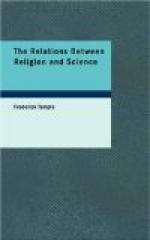But this is not all. For besides the sense of responsibility we have a direct consciousness of being free, a consciousness which no reasoning appears to extinguish. We sharply distinguish between that which goes on within us in regard to which we are free and that in regard to which we are not free. We cannot help being angry, but we can control our anger. We cannot help our wishes, but we can restrain our indulgence or our pursuit of them. We cannot directly determine our affections, but we can cherish or discourage them. There are extreme cases in which our wills seem powerless, but even here we are conscious of our power to struggle for self-assertion and self-control. There is very much in us which is not free; nay, there is much in us which impels us to action which is not free. But we never confound this with our wills, and when our wills are overpowered by passion or appetite, we call the act no longer a perfectly free act, and do not consider the responsibility for it to be quite the same.
This question of the freedom of the will was considered by Bishop Butler in the Analogy. He contented himself with proving that, make what theory we would concerning the necessity of human action, all men in practice acted on the theory of human freedom. We promise; we accept promises; we punish; we reward; we estimate character; we admire; we shun; we deal with ourselves; we deal with others; as if we and all others were free. And this was enough for his purpose. For he had to reconcile a Divine system of rewards and punishments with our sense of justice. And if he could show, as he did, that rewards and punishments were plainly not inconsistent with that sense of justice in our dealings with one another, it was impossible to call them inconsistent with that sense of justice in God’s dealings with us.
But the purpose of these Lectures requires something more, and that for two reasons. For, in the first place, the doctrine of necessity was most often in Bishop Butler’s days derived from a conception of a Divine foreknowledge arranging everything by supreme Will, not from the conception of a blind mechanical rule holding all in its unrelaxing grasp. And though to the cold reason it may make no difference how the will is bound, yet to the moral sentiment the two kinds of compulsion differ as life and death. To have no liberty because of being absolutely in the hands of Almighty God is quite another thing from having no liberty, as being under the dominion of a dead iron rule. It seems possible to accept the one and call it an unfathomable mystery; but to accept the other is to call life a delusion and the moral law a dream. And in the second place, the doctrine of necessity advanced as a theory and based on arguments not resting on facts, is a very different antagonist from the same doctrine advanced as a conclusion of science, and as deducible from a mass of co-ordinated observations. We may dismiss the mere theory after showing that it has not substance enough to hold its ground in ordinary life. We cannot so treat what claims to be a scientific inference.




